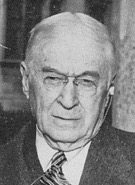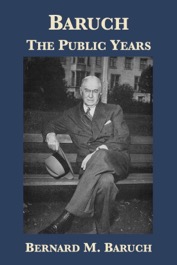
In 1916, Baruch left Wall Street to advise President Woodrow Wilson on national defense. He served on the Advisory Commission to the Council of National Defense and, in January 1918, became chairman of the new War Industries Board which successfully managed economic mobilization during World War I. He received the Army Distinguished Service Medal for his work for the war effort. In 1919, Wilson asked Baruch to be on his staff at the Paris Peace Conference, where he opposed what he saw as unrealistically high reparations imposed on Germany.
In the interwar years, Baruch was a strong advocate of US preparedness and of a more powerful War Industries Board, should war happen again. He remained a prominent government adviser during this time, anticipated a Wall Street crash as early as 1927, selling stocks short periodically in 1927 and 1928, and supported Franklin D. Roosevelt’s domestic and foreign policies after his election.
All through World War II, Baruch was a close advisor to FDR on the role of industry in war supply, was credited with greatly shortening the production time for tanks and aircraft and was appointed troubleshooter on several issues, including the supply of rubber to the armed forces. In 1944, Baruch commissioned a committee of physicians to help establish the specialty of Physical Medicine and Rehabilitation and provided over a million dollars of funding to many medical schools to further this cause. Baruch’s father had been a surgeon and was the first teacher of physical medicine at Columbia.
In 1946, Truman appointed him as the US representative to the United Nations Atomic Energy Commission (UNAEC), but his “Baruch Plan” for international control of atomic energy was rejected by the Soviet Union.
Click on the cover for details about the eBook:




